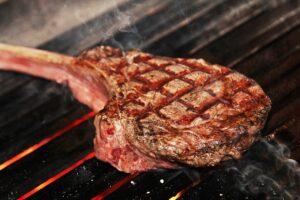Key Takeaway
| Hard Nitriding Cast Iron vs Carbon Steel for Cooking: Which is better? |
|---|
| Hard nitriding cast iron is tougher and more durable than carbon steel, making it ideal for cooking. |
| With proper seasoning, hard nitriding cast iron can be non-stick and easy to clean. |
| Carbon steel is lighter and heats up faster than hard nitriding cast iron, but it may not last as long. |
| Choosing between the two comes down to personal preference and cooking needs. |
When it comes to cooking, choosing the right cookware is crucial. Hard nitriding cast iron and carbon steel are two popular options, but which one is better? Let’s find out.
Hard Nitriding Cast Iron
Hard nitriding is a special process that involves heating cast iron in the presence of nitrogen gas. This process makes the cast iron tougher and more durable, which is perfect for cooking. Hard nitriding cast iron is also resistant to scratches and chipping. With proper seasoning, this cookware can also be non-stick and easy to clean.
One downside to hard nitriding cast iron is that it can be heavy and take longer to heat up than other cookware materials. However, it retains heat well, making it ideal for dishes that require a consistent temperature. And, with proper care, hard nitriding cast iron can last a lifetime.
Carbon Steel
Carbon steel is a popular choice among professional chefs. It’s lighter than hard nitriding cast iron and heats up quickly, which is great for searing and sautéing. Carbon steel also cools down quickly, making it easy to control the temperature of your cooking.
However, carbon steel may not be as durable as hard nitriding cast iron. With repeated use, it may start to warp or develop hot spots. Carbon steel also requires seasoning to prevent food from sticking to the pan or wok.
Which is Better?
When it comes to choosing between hard nitriding cast iron and carbon steel, it ultimately comes down to personal preference and cooking needs. Here are a few things to consider:
- Weight: If you prefer lighter cookware, carbon steel may be the better option.
- Durability: If you want cookware that will last a lifetime, hard nitriding cast iron wins.
- Heat retention: If you need your cookware to retain heat well, hard nitriding cast iron is the way to go.
- Non-stick surface: With proper seasoning, both hard nitriding cast iron and carbon steel can be non-stick. However, some people find that hard nitriding cast iron is easier to season and maintain.
Conclusion
In conclusion, both hard nitriding cast iron and carbon steel have their pros and cons. For those who prefer heavy-duty cookware that will last a lifetime, hard nitriding cast iron is the way to go. But, for those who prefer lighter cookware that heats up quickly, carbon steel is the better option. Consider your cooking needs and personal preferences before making a decision.
Table 1: Pros and Cons
| Hard Nitriding Cast Iron | Carbon Steel |
|---|---|
| + Tough and durable | + Lightweight |
| + Resistant to scratches and chipping | + Heats up quickly |
| + Retains heat well | + Cools down quickly |
| + With proper seasoning, can be non-stick | + Easy to control temperature |
| – Heavy | – May not last as long |
| – Takes longer to heat up | – May warp or develop hot spots |
| – Requires seasoning | – Requires seasoning |
List 1: Considerations
- Weight
- Durability
- Heat retention
- Non-stick surface
Table 2: Comparison
| Hard Nitriding Cast Iron | Carbon Steel |
|---|---|
| Ideal for dishes that require a consistent temperature | Great for searing and sautéing |
| Retains heat well | Cools down quickly |
| Tough and durable | Lightweight |
| Resistant to scratches and chipping | Easy to control temperature |
| With proper seasoning, can be non-stick | Requires seasoning |
| Takes longer to heat up | May not last as long |
